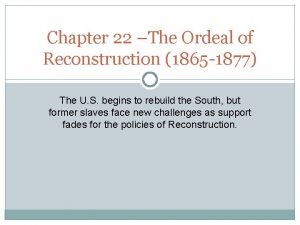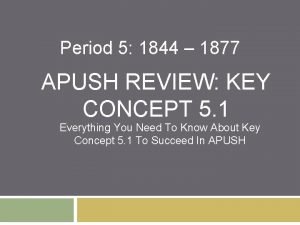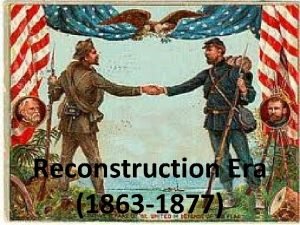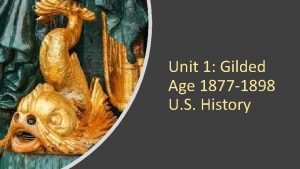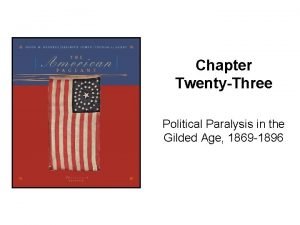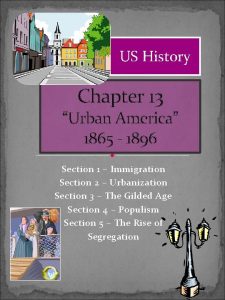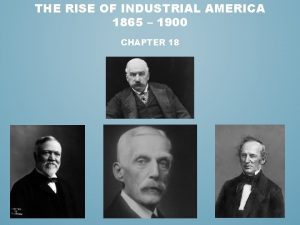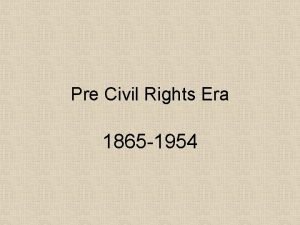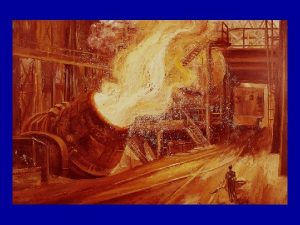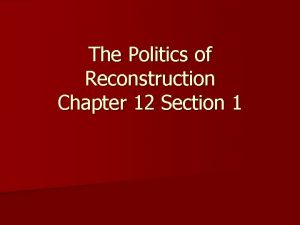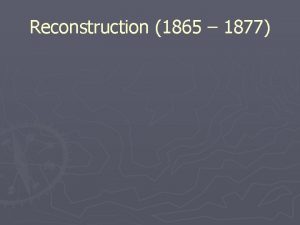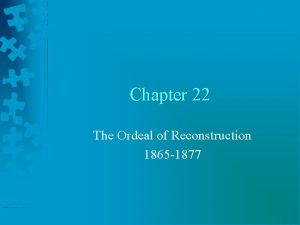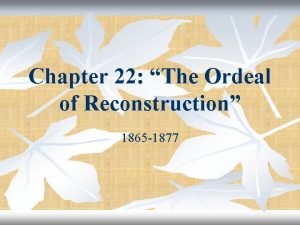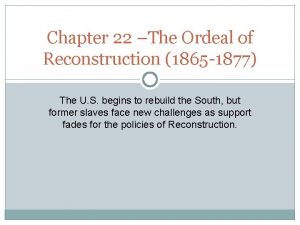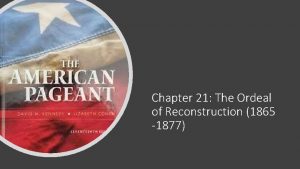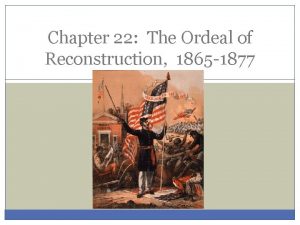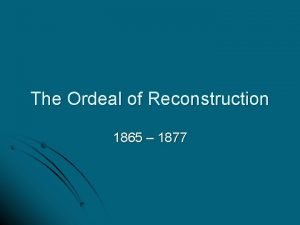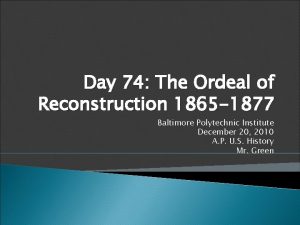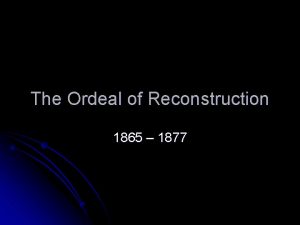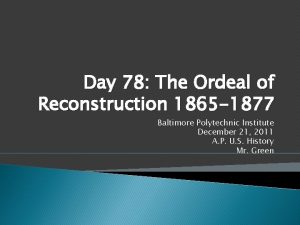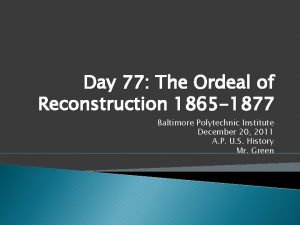Chapter 22 The Ordeal of Reconstruction 1865 1877







































- Slides: 39

Chapter 22: The Ordeal of Reconstruction: 1865 -1877 Unit 6: Civil War and Reconstruction

Chapter Theme • During Reconstruction, the Constitution was strengthened with the Fourteenth (citizenship and equal protection of the laws) and Fifteenth (black male voting rights) Amendments, but it was also tested with the conflicts between the president and Congress that culminated in an impeachment process

Chapter Theme • Southern resistance to Reconstruction began immediately with the sending of ex-rebels to be seated in Congress and continued with the creation of violently oppressive groups like the Ku Klux Klan. Although forced to make some concessions, Southern Redeemers successfully outlasted the congressional Reconstruction efforts

The War is Over • How will the nation be reunited? • What to do about all the captured Confederate leaders? • How to rebuild the South?

The South After the War • Hyperinflation shuttered banks and businesses • No transportation system • Agriculture system destroyed – Seed shortage – Loss of labor – Livestock driven off

The End of the Planter Aristocracy • Cotton production in the Southwest • Depreciated land values in the South – Loss of property ($2 billion from slaves) • Yet, defiant – Continued belief in their just cause – Ill omen for Reconstruction

Emancipation • Disorganized emancipation • Initially suspicious and uncertain • Search for relatives, opportunity • Church ass the focus of the black community – AME Church

Adjusting to the Demands of Freedom • Need for money, education, support, food • Aid came from North – American Missionary Association • Aid came from the federal government Freedman’s Bureau – Established to provide food, clothing, medical care, and education to freedmen and to white refuges – Headed by Oliver O. Howard

Thirteenth Amendment « Ratified in December, 1865. « Neither slavery nor involuntary servitude, except as punishment for crime whereof the party shall have been duly convicted, shall exist within the United States or any place subject to their jurisdiction. « Congress shall have power to enforce this article by appropriate legislation.

Accomplishments and Problems • Resented in the South • Little land actually went to freedmen • Opposed by Andrew Johnson • Expired in 1872

Timetable of Reconstruction Year Began Year Ended Proposal or Plan 1864 1865 Lincoln’s 10 percent proposal 1865 1866 Johnson’s version of Lincoln’s proposal 1866 1867 Congressional plan: 10 percent plan with Fourteenth Amendment 1867 1877 Congressional plan of military Reconstruction: Fourteenth Amendment plus black suffrage, later established nationwide by the Fifteenth Amendment

Lincoln’s 10% Reconstruction Plan – – – Proclamation of Amnesty and Reconstruction (December 8, 1863) Replace majority rule with “loyal rule” in the South. He didn’t consult Congress regarding Reconstruction. Pardon to all but the highest ranking military and civilian Confederate officers. When 10% of the voting population in the 1860 election had taken an oath of loyalty and established a government, it would be recognized.

Implementation « 1864 “Lincoln Governments” formed in LA, TN, AR * “loyal assemblies” * They were weak and dependent on the Northern army for their survival.

Congressional Response • Congress feared return of the planter aristocracy • Passed the Wade-Davis Bill – 50% of a state’s voters take the oath of allegiance – Stronger safeguards of emancipation – Pocket Veto by Lincoln • Highlighted difference between Lincoln and Congress and between Republicans – Conquered provinces

Andrew Johnson « Jacksonian Democrat. « Anti-Aristocrat. « White Supremacist. « Agreed with Lincoln that states had never legally left the Union. I am Damn the negroes! fighting these traitorous aristocrats, their masters!

Johnson’s Reconstruction Plan • Recognized Lincoln’s 10 percent governments • Disenfranchised certain leading Confederates – Taxable property > $20, 000 • Could petition for personal pardons • Call for state conventions to repeal ordinances of secession, repudiate all Confederate debts and ratify the 13 th Amendment

Growing Northern Alarm! « Many Southern state constitutions fell short of minimum requirements « Johnson granted 13, 500 special pardons « Return of the planter elite « Revival of southern defiance BLACK CODES

Black Codes « Purpose: « Guarantee stable labor supply now that blacks were emancipated. « Restore pre-emancipation system of race relations. « Forced many blacks to become sharecroppers [tenant farmers].

Growth of Sharecropping « Similar to re-enslavement

Congressional Reconstruction • Reaction to appearance of “whitewashed rebels” in Congress • Republican (northern) adjustment to loss of power – No southern states from 1861 -1865 – Former slaves were no longer 3/5 ths of a person – Shift in the balance of power • Congress angered by Johnson’s restoration of the union

The Balance of Power in Congress State White Citizens Freedmen SC 291, 000 411, 000 MS 353, 000 436, 000 LA 357, 000 350, 000 GA 591, 000 465, 000 AL 596, 000 437, 000 VA 719, 000 533, 000 NC 631, 000 331, 000

Civil Rights Bill • Congress passed the Civil Rights Bill in March 1866 – Blacks gained American citizenship • Johnson veto • Fearing eventual repeal, Congress proposed the Fourteenth Amendment – Radical Republicans were disappointed that it didn’t include male suffrage

14 th Amendment « Ratified in July, 1868. * Provide a constitutional guarantee of the rights and security of freed people. * Insure against neo-Confederate political power. * Enshrine the national debt while repudiating that of the Confederacy. « Southern states would be punished for denying the right to vote to black citizens!

Congress Breaks with the President « Congress bars Southern Congressional delegates. « Joint Committee on Reconstruction created. « February, 1866 President vetoed the Freedmen’s Bureau bill. « March, 1866 Johnson vetoed the 1866 Civil Rights Act. « Congress passed both bills over Johnson’s vetoes 1 st in U. S. history!!

The 1866 Bi-Election « A referendum on Radical Reconstruction. « Johnson made an ill-conceived propaganda tour around the country to push his plan. « Republicans won a 3 -1 majority in both houses and gained control of every northern state. Johnson’s “Swing around the Circle”

Radical Plan for Readmission « Reconstruction Act « Civil authorities in the territories were subject to military supervision. « Required new state constitutions, including black suffrage and ratification of the 13 th and 14 th Amendments. « In March, 1867, Congress passed an act that authorized the military to enroll eligible black voters and begin the process of constitution making.

Reconstruction Acts of 1867 « Military Reconstruction Act * Restart Reconstruction in the 10 Southern states that refused to ratify the 14 th Amendment. * Divide the 10 “unreconstructed states” into 5 military districts.

Reconstruction Acts of 1867 « Command of the Army Act * The President must issue all Reconstruction orders through the commander of the military. « Tenure of Office Act * The President could not remove any officials [esp. Cabinet members] without the Senate’s consent, if the position originally required Senate approval. § Designed to protect radical members of Lincoln’s government. § A question of the constitutionality of this law. Edwin Stanton

President Johnson’s Impeachment « Johnson removed Stanton in February, 1868. « Johnson replaced generals in the field who were more sympathetic to Radical Reconstruction. « The House impeached him on February 24 before even drawing up the charges by a vote of 126 – 47!

The Senate Trial « 11 week trial. « Johnson acquitted 35 to 19 (one short of required 2/3 s vote).

Fifteenth Amendment • Radical Republicans feared that readmitted states would repeal voting rights • Fifteenth Amendment was ratified in 1870 – Black male suffrage

Constitutionality of Military Reconstruction • Supreme Court ruling Ex parte Milligan stated that military tribunals could not try civilians, even during wartime, in areas where the civil courts were open – Despite questionable constitutionality, Supreme Court did not oppose Military Reconstruction • By 1870 all Southern states had reorganized their governments • Eventual return of power to white Redeemers and strong Democratic control in the South

Disappointment for Women • Reconstruction amendments ignored women’s rights • Women’s Loyal League had worked for black emancipation at the expense of their own issues – Elizabeth Cady Stanton and Susan B. Anthony campaigned against the 14 th Amendment

Reconstruction in the South • Black men organized politically – Union League served as a network of political clubs that campaigned for Republican candidates • Expanded mission included building black churches and schools, representing black grievances before employers and governments • Recruited black militias to protect against which retaliation

Black Political Power • Blacks served as delegates to state constitutional conventions • Between 1868 and 1876 there were 14 black congressmen and two black senators • Blacks also served in state and local governments

Radical Legislative Achievements • • • Established public schools Streamlined tax systems Began public works projects Granted Property rights to women Yet, Graft was common

Southern Anger • Scalawag – Southerners who supported Republicans • Carpetbaggers – Northerners who move south for economic opportunity

The Ku Klux Klan • Secret organizations established in response to radical reconstruction • The Ku Klux Klan intimidate black voters, scalawags and carpetbaggers • Intimidation escalated to violence • Congress passed the Force Acts in response – Limited effectiveness

Purchase of Alaska • By 1867, Russia was willing to sell their Northern territory of Alaska • Sec’y of State Seward signs a treaty with Russia, giving them $7. 2 million for Alaska • Seward’s Folly • Russia had been friendly to the Union during the Civil War
 1877-1865
1877-1865 Chapter 22 the ordeal of reconstruction
Chapter 22 the ordeal of reconstruction Chapter 22: the ordeal of reconstruction
Chapter 22: the ordeal of reconstruction Ordeal chapter 22
Ordeal chapter 22 Ordeal chapter 21
Ordeal chapter 21 Chapter 3 industrialization (1865 to 1901 answers)
Chapter 3 industrialization (1865 to 1901 answers) What is the supreme ordeal in the odyssey
What is the supreme ordeal in the odyssey Trial by ordeal definition
Trial by ordeal definition Ordeal by cheque activity
Ordeal by cheque activity Supreme ordeal definition
Supreme ordeal definition Ordeal by cheque assignment answer key
Ordeal by cheque assignment answer key Ordeal by cheque interpretation
Ordeal by cheque interpretation Georgia history timeline 1877-1919
Georgia history timeline 1877-1919 Haymarket square riot apush
Haymarket square riot apush Apush period 5 key concepts
Apush period 5 key concepts Compromise of 1877
Compromise of 1877 Gilded age labor strikes
Gilded age labor strikes Whats the compromise of 1877
Whats the compromise of 1877 1877 golden 1
1877 golden 1 Tanssija 1877-1927
Tanssija 1877-1927 Define reconstruction era
Define reconstruction era The gilded age 1877 to 1898 worksheet answers
The gilded age 1877 to 1898 worksheet answers 1894 railroad strike
1894 railroad strike The key tradeoff featured in the compromise of 1877
The key tradeoff featured in the compromise of 1877 Urban america 1865 to 1896
Urban america 1865 to 1896 Hollywood silver fox farm v emmett
Hollywood silver fox farm v emmett The rise of industrial america 1865-1900
The rise of industrial america 1865-1900 The rise of industrial america 1865-1900
The rise of industrial america 1865-1900 15 th ammendment
15 th ammendment Becoming a world power 1865-1917
Becoming a world power 1865-1917 Traits of impressionism
Traits of impressionism Chapter 20 becoming a world power notes
Chapter 20 becoming a world power notes Chapter 2 settling the west
Chapter 2 settling the west Gregor mendel 1865
Gregor mendel 1865 Where did the term impressionism come from
Where did the term impressionism come from Realism regionalism and naturalism
Realism regionalism and naturalism Industrialization (1865 to 1901 worksheet answers key)
Industrialization (1865 to 1901 worksheet answers key) 1865 to 1900 inventions
1865 to 1900 inventions Chapter 12 section 1 the politics of reconstruction
Chapter 12 section 1 the politics of reconstruction Chapter 12 section 3 the collapse of reconstruction
Chapter 12 section 3 the collapse of reconstruction


